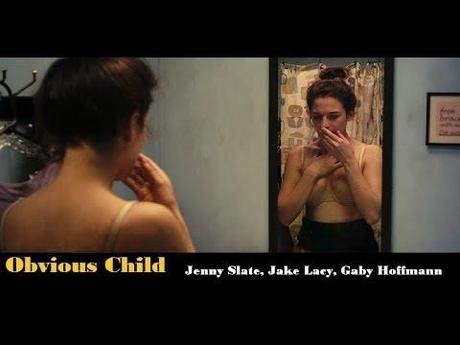Last week, I was able to score some passes to a screening of Obvious Child from Feministing.com. Just the idea of a romantic comedy about abortion made my feminist mind little-kid-giddy. Obvious Child was everything that society needs it to be: funny and important. This film changes the narrative about abortion so often portrayed in television and films, including plots in which abortions are depressing, dark and complicated. Obvious Child instead portrays a very relatable array of characters who navigate the circumstances around a pending abortion.
The main character, Donna Stern, is a comedian and bookstore saleswoman who is in the midst of dealing with a heart breaking betrayal involving her friend and now ex-boyfriend. In an effort to foster her emotional resiliency and enjoy herself, Stern has sex with the handsome and wholesome Max. The two unintentionally conceive and Stern decides to have an abortion.
The film does a stellar job of portraying some very important components of the road to abortion. First, Stern is unsure if she should or has a responsibility to share the news of her unplanned pregnancy and decision to terminate with Max. Stern’s two friends weigh in differently: her best friend Nellie asserts that it’s her body and therefore no one else is owed this information while her other friend suggests she should inform Max and give him the opportunity to be a part of the process. Stern even grapples with whether or not to share her decision with her mother, a Type A, respected business professor. When Stern does share the news with her mother, something beautiful happens. Her mother responds with warm casualness then goes on the tell Stern that she too had an abortion while in college, on the kitchen table of a New Jersey apartment. Dialogue about abortion and sex are free flowing and respectful throughout this film, illustrating the reality that sex and abortion are normal and common occurrences for women and open discourse enhances support and education.
At this point the cast members that have received abortion services is up to three. Stern herself, her mother and friend Nellie, who had an abortion presumably while she was young, share their personal experiences and perspectives in the film. All three women exhibit positive feelings about their abortions, which is not uncommon in reality. While anti-choice groups perpetuate the idea that life after abortion will be a depressing eternity filled with emptiness and guilt, Obvious Child (and scientific research) tell a different and more accurate story. According to a Medical News Today study, only 5% – 30% of women report feelings of regret, anxiety, guilt, mild depression and after having an abortion. The perception that post-abortion stress is not a definite outcome is critical to dispel anti-choice myths.
When Stern makes her appointment for her abortion, she is pained by the price tag of $500.00. Financial barriers are very real and very common obstacles for women accessing reproductive healthcare. While prices vary between both states and providers, access to safe abortion is not cheap. For Stern and many other women, the monetary cost of abortion can be daunting. Stern herself is not a member of the lower class and presumably has alternative financial sources should she not be able to swing the payment but I was happy that this was included in the film because the cost of healthcare is a pressing issue for women in America.
Finally, Max, Stern’s sexual partner establishes a nice road map for appropriate male behavior during the time of an abortion. Although he excuses himself after initially hearing the news he arrives the day of the procedure, expresses his support and asks permission to attend. Max follows Stern’s lead and allows her to set the mood of the day. He makes the post-abortion recovery enjoyable and comfortable. I think men are often unsure what the right things to do and say are when their sexual partner is having an abortion. Obvious Child, even if it does so inadvertently, serves as a nice reference for men looking to support their partner in a healthy way.
While Obvious Child is a humorous film, it does not make abortion a joke, but a normalized life experience. Our society desperately needs tools like this film to shift towards normalizing abortion in order to support women and recognize that safe and accessible abortions are a healthcare necessity.
I want to thank everyone involved in the film for being a catalyst to change not only the conversation and cinematic schemas about abortion, but hopefully cultural attitudes and understandings about what is in fact a real part of many women’s lives.


